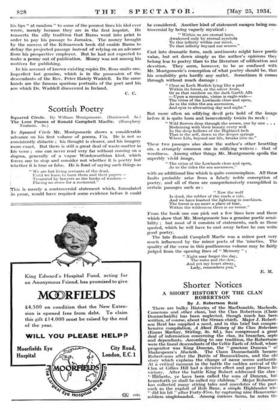Scottish Poetry
IN Squared Circle Mr. Montgomerie shows a considerable
advance on his first volume of poems, Via. He is not so consistently didactic ; his thought is clearer, and his imagery more exact. But there is still a great deal of waste-matter in his verse ; one can never read very far without coming on a dogma, generally of- a vague Wordsworthian kind, which forces one to stop and consider not whether it is poetry but !whether it is true or false. He is fond of saying such things as
" We are but living servants of the dead,
Until we learn to burn them and their papers— Treasured by lawyers as the books of wisdom— Placing no stone for a memorial."
"1"1, iis is merely a controversial statement which, formulated in prose, would have required some evidence before it could
be considered. Another kind of statement escapes being con- troversial by being vaguely mystical :
" Within us are eternal laws, Awakened only by eternal symbols To this infinity within our mind, To that infinity beyond our senses."
Cast into dramatic form, such sentiments might have poetic value, but set down simply as the author's opinions they belong less to poetry than to the literature of edification and devotion. They seem, however, to be so confused with Mr. Montgomerie's conception of what poetry should be, that his sensibility gets hardly any outlet. Sometimes it comes through without much damage :
" Clear as Loch Morlich lying like a pool Within its forest, or the silver Avon, Or as that rainbow on the dark Garbh Alit —Upon a mountain, vision is eagle-wide- The cities of the Lowlands close and open, As to the tides the sea anemones, And eyes to alternating day and night."
But more often an edifying devil gets hold of the image before it is quite born and benevolently twists its neck :
" Wild flowers drop through the senses, one by one . . Medieining with their beauty every well In the deep hollows of the Highland loch That is the self, down to the deeper springs Where Life, beyond our life, breaks into us."
These two passages also shciw tfie author's other besetting sin, a strangely common one in edifying writers : that of wordiness. Among other things Mr.. Montgomerie spoils the superbly vivid image,
" The cities of the Lowlands close and open, As to the tides the sea anemones,"
with an additional line which is quite commonplace. All these faults probably arise from a falsely noble conception of
poetry, and all of them are comprehensively exemplified in certain passages such as :
" Now the wolf
Is dead, the robber of the roads a tale, And we have leashed the lightning in machines.
The forest is no more a place of fear, Within the wilderness there is no terror."
From the book one can pick out a few lines here and there which show that Mr. Montgomerie has a genuine poetic sensi- bility ; but most of it consists of statements, such as those
quoted, which he will have to cast away before he can write good poetry.
The late Ronald Campbell Macfie was a minor poet very much influenced by the minor poets of the 'nineties. The quality of the verse in this posthumous volume may be fairly judged from the opening lines of " Memory " :
" Night may forget the day, The roses and the dew, And yet my heart alway, Lady, remembers you." E. M.
















































 Previous page
Previous page